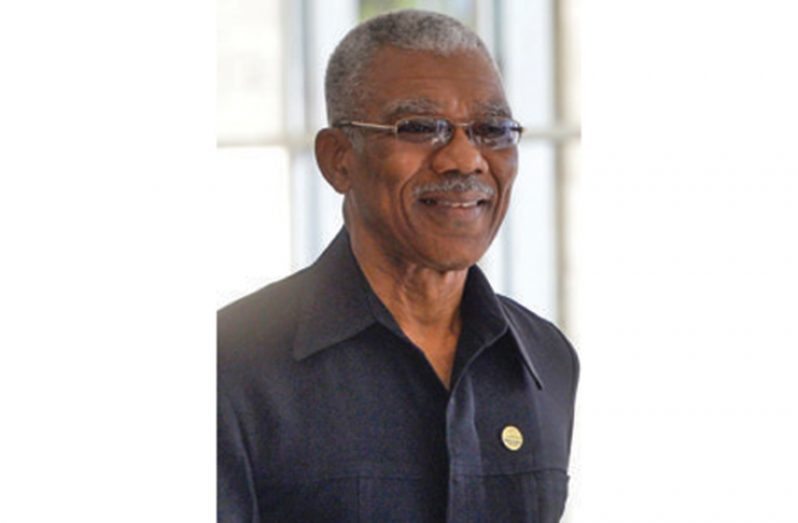…President says political dialogue to continue with opposition
President David Granger and Opposition Leader Bharrat Jagdeo are set to meet this month to further discuss and collaborate on things of national interest.
This is according to President David Granger during a press conference hosted on Friday at the Ministry of the Presidency. The President was, at the time, responding to a question about the Head of the Carter Center and former United States President Jimmy Carter, intervening in the political process of creating dialogue between President Granger and the opposition leader.
“As a friend of Guyana, he (Jimmy Carter) enquired about the process and whether there were any obstacles and I gave him some answers based on the experiences we had since 2015, so I would not agree there is an ongoing process supervised by the US department. I have always been open to meetings with Mr. Jagdeo and I will continue. I have never denied, failed or refuse to meet with Mr. Jagdeo. I wouldn’t. As leader of the opposition, Jagdeo represents a significant part of the population,” the President said. “I don’t need Mr. Carter to tell me that so there is no Carter process taking place and, as far as I’m concerned, Mr. Jagdeo and I speak the same language and I think we could make progress on our own,” President Granger told a news conference held at the Ministry of the Presidency.
The President noted that Mr. Carter is not a negotiator in Guyana’s political arena and he is not a broker or is he establishing some new procedure. Disclosure of the former American leader’s discussions with President Granger and subsequently Jagdeo had come following a meeting with the Guyanese leaders back in July. The President then agreed to lead talks between the government and the opposition.

Jagdeo had told the media that he had received a call from President Carter in July after the former President got word that the PPP had refused the offer to engage in amiable talks with government. “The impression I got from President Carter is that in his conversation with the President, the President stated that he was inclined to have talks with us but we in the PPP we not so inclined because we don’t like Nagamootoo. And, so, I pointed out to President Carter that it was not Nagamootoo that was the issue, it was our concern that…he would not be able to commit the APNU to anything at the meeting,” Jagdeo said.
However, despite saying this in a statement issued back in 2015, the PPP had this to say regarding Nagamootoo: “Knowing the dim view the PPP holds of Moses Nagamootoo, the APNU+AFC by insisting that he is their ‘best man’ who will head its team must know that that initiative will go nowhere. Thus, by pushing Nagamootoo centre stage, it is now pellucidly clear that the coalition’s objective is not to have any talks at all, but to put the PPP/C on the defensive and to project the party as refusing to engage in talks with the government.” Prime Minister Nagamootoo, who is a former PPP executive, has maintained that he had no axe to grind with the PPP and is ready to enter talks on national unity.
President opted that if the PPP has an issue with the Prime Minister, he (the President) would lead the discussions which are to be focused on the pertinent issues of crime, oil and gas and the environment. Although the compromise was made, the opposition leader told the media that he would have to discuss with the PPP executives whether the body wishes to deliberate with the government on the above mentioned issues.
For decades, the former US President has been involved in the assistance of smooth political processes in Guyana facilitating the country’s first internationally certified free and fair elections in 1992. He last visited Guyana in 2015 where he co-led the Carter Center’s 100th election observation mission of the May 11 General and Regional elections. Over the years, there have been calls for the major political parties, the PPP and the People’s National Congress Reform (PNCR) to put their differences aside and have political dialogue on social and economic matters of high importance. Collaboration by the major political forces, it has been opined, can foster confidence, trust, as well as good cordial relations at the national level, thereby obtaining solutions to matters of national importance.
The APNU+AFC coalition government has from its very formation stressed inclusionary governance. In fact, President Granger has repeatedly said that his administration is committed to inclusionary democracy and is prepared to consider executive power-sharing with the PPP/C. Back in September 2015, the President noted that at that year’s General and Regional Elections, the coalition secured 51 per cent of the votes cast by the electorate and as such, it would not be prudent for his government to exclude the PPP/C support base. “We have at all times aimed at having inclusionary democracy and inclusionary government, so that the 49 per cent don’t feel locked out.” The head-of-state stressed that national unity is part of the philosophy of the coalition and noted that there must be some form of sharing, national unity and inclusionary governance.
The Carter Center’s involvement dates back to 1990 when it brokered key electoral reforms such as fresh house-to-house registration, a seven-member Guyana Elections Commission and the counting of votes at the place of poll. It is believed that he has met more Presidents in Guyana than in any other country, having held talks with the late Cheddi Jagan, Desmond Hoyte and Janet Jagan and, more recently, consulted former Presidents Bharrat Jagdeo and Donald Ramotar and sitting President, David Granger on matters mainly related to elections and bipartisan dialogue.



.jpg)











